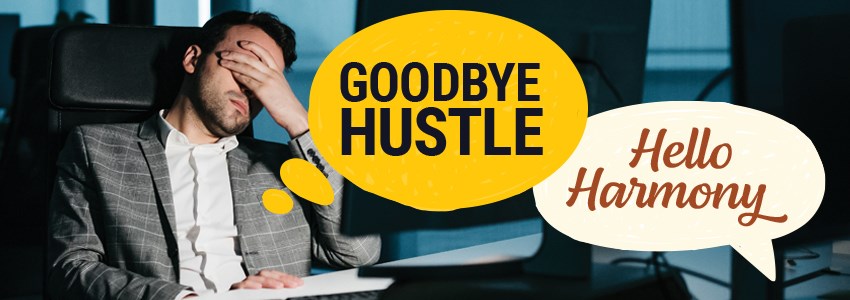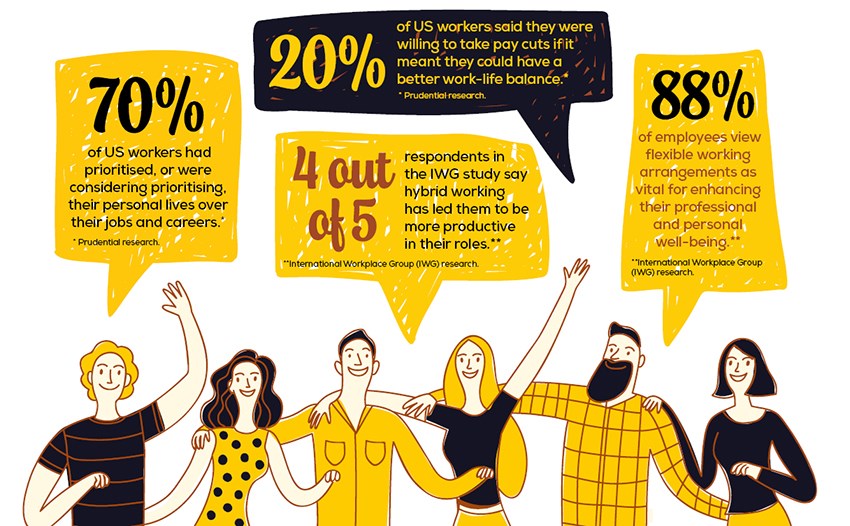Goodbye Hustle, Hello Harmony

Workplace Culture Makes a Positive Shift
Working long hours to achieve success may have been the mindset for many people in the past, however, following the pandemic and a few tough years of lockdowns, a large portion of workers are now prioritising health, well-being and home life over the ‘hustle’.
If you have had anything to do with the corporate world, it’s likely you have heard of ‘hustle culture’ - wake up early, work tirelessly without taking breaks, push hard to achieve more, then eventually reap the rewards. The core idea here is that there’s always more to strive for: more money to make, a bigger job to be had, and greater goals to smash.
This is hardly a balanced approach. But it became popular in the 1990s and early 2000s, when certain high-profile tech CEOs in Silicon Valley set the trend with their relentless 24/7 work ethic. Work life was everything! Go hard or go home! Over the past decade, hustle culture has also become celebrated and widespread among influencers, celebrities, executives and working professionals, thanks in part to the sway of social media.
The problem is, overworking - and glorifying it - invariably creates an air of hyper-competitiveness, pressure, fear, guilt and shame. Employees’ mental health can be affected, burnout is common, and work-life balance becomes seriously skewed. Perhaps that’s why hustle culture is on its way out.
Factors Driving The Shift
When COVID-19 hit, workers worldwide were able to step off, take a breath, and take stock of what they really wanted from life, both personally and professionally. Many decided to ‘quietly quit’, i.e., walk away from unhealthy workplaces, adjust their focus, set boundaries, and dedicate more time to family, personal passions and hobbies.
The old pattern of constantly chasing promotions and aiming for higher pay didn’t fit this new mindset. In fact, a 2022 survey by US insurance company Prudential showed 70% of US workers had prioritised, or were considering prioritising, their personal lives over their jobs and careers, with 20% saying they were willing to take pay cuts if it meant they could have a better work-life balance.
Enhanced awareness of social inequality has been another factor driving the move away from the ‘rise-and-grind’. The pandemic exposed the myth of hustle as a meritocracy, where hard work and long hours guaranteed success. Marginalised groups, including those on lower incomes and minorities, faced significant economic barriers and lacked access to the networks, resources and opportunities that provided upward mobility. Women and caregivers, in particular, were systematically excluded from professions that demanded excessive hours. Start-ups led by women and minority founders also struggled to secure funding, perpetuating inequalities in entrepreneurship.
It didn’t matter how hard these groups ‘hustled’, they remained at a disadvantage and less likely to get to those giant pay packets or top-tier positions.
Hybrid Work: A Game Changer
The widespread adoption of hybrid work, where employees are balancing out their working hours between home, flexi-spaces and the office, has been somewhat of an equaliser, paving the way for a new approach to work and life. It’s allowing people more freedom, and encouraging a healthier, more balanced ‘outcomes over hours’ approach.
Recent research from the International Workplace Group (IWG) highlights that 88% of employees view flexible working arrangements as vital for enhancing their professional lives, citing that it positively affects their mental, physical, financial, and social well-being. Workers have expressed a sense of increased control and empowerment within the hybrid work model. They are enjoying time and cost savings from no longer needing to commute, and they are relishing the newfound flexibility and autonomy in being able to choose how, when, and where they tackle their daily tasks.
Giving workers greater control over their schedules not only means they can manage their work hours more effectively, but they can also prioritise important aspects of their lives, including proper nutrition, regular exercise, sufficient rest, and quality time with loved ones or pursuing hobbies.
A happier, healthier workforce is far more motivated than an over-tired and stressed one. Content workers are not only more satisfied with their jobs, but also tend to be more productive. And the research backs this up, with four out of five respondents in the IWG study saying that hybrid working had led them to be more productive in their roles. This increased productivity benefits businesses by driving revenue up and costs down, ultimately leading to a more prosperous and sustainable operation.
Finally, and importantly, the positive impact of the hybrid work model and flexible schedules extends to the environment. With less time spent commuting, emissions are reduced. Which effectively helps in the fight against climate change, contributing to a healthier planet.

